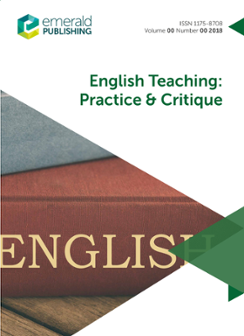Table of contents
“I felt goosebumps”: emotional experiences of pre-service English teachers and the critical use of narratives
Emma Abruzzo, Katrina Bartow JacobsThis paper aims to suggest a new way for structuring English teacher preparation within traditional university programs, challenging the age-old use of formal lesson plan…
Constructions of youth and responses to problematic authors: examining ELA teachers’ choices to select or avoid Sherman Alexie
Mike P. Cook, Ashley Boyd, Brandon SamsThe purpose of this study was to examine how teachers’ constructions of youth inform their text selections, particularly as they relate to a problematic author.
New conceptual tools for be(com)ing antiracist (teacher) educators at PWIs
Caroline T. Clark, Rachel Skrlac Lo, Ashley Boyd, Michael Cook, Adam Crawley, Ryan M. RishThis study aims to share the development of new conceptual tools, which merge theories of critical whiteness studies (CWS), epistemic injustice and abolitionist teaching, applying…
“From the beginning, I think it was a stretch” – teachers’ perceptions and practices in teaching multiliteracies
Fei Victor Lim, Alexius Chia, Thi Thu Ha NguyenThe purpose of this study is to examine five Secondary English Language teachers’ perceptions and practices of multiliteracies teaching in the context of a decade after…
Solution-based orientation as an element in selecting videos on social issues
Zawan Al BulushiThis study aims to explore students’ interests in multimodal texts by focusing on videos of social issues.
“Live within the messiness”: how a digitally mediated inquiry community supported ELA teachers in cultivating adaptive repertoires
Bethany Monea, Katie Burrows-Stone, Jennifer Griffith Dunbar, Jennifer Freed, Amy Stornaiuolo, Autumn A. GriffinAdaptivity has long been recognized as a key aspect of teaching and shown to be particularly important for English Language Arts (ELA) teachers leading discussions about texts…
Queer and trans youth (not) knowing: experiences of epistemic (in)justice in the context of an LGBTQ+-inclusive secondary curriculum
Ryan ScheyCurrent legislative, policy and cultural efforts to censor and illegalize classroom discussions and curricular representations of LGBTQ+ people reflect longstanding challenges in…
For concurrent enrollment, collaboration, not alignment, is the better story
Burke ScarbroughAs concurrent enrollment (CE) programs continue to expand in the USA, a growing share of English teaching at the first-year university level is taking place in secondary schools…
“Literacy to me is about power”: reading book-length fiction and non-fiction texts in a disciplinary literacy teacher education course
Mary Neville, Rick MarlattThis paper aims to examine the reading of a book-length fiction or non-fiction text in one disciplinary literacy (DL) teacher education course. This paper considers how the…
Shifting pedagogy, shifting practice: teachers’ perceptions of project-based learning in English language arts
Karoline Trepper, Alison Boardman, Antero GarciaThis paper aims to explore teachers’ shifts in pedagogy and practice as they implemented a project-based learning (PBL) approach to teaching English Language Arts (ELA) for the…
Exploring the challenges and possibilities of critical literacy pedagogy: K-8 teacher discussions about race in a virtual professional development course
Audrey Lucero, Janette Dalila AvelarThe purpose of this study is to better understand the ways in which K-8 teachers from a semirural, predominantly white district perceive their responsibilities to work toward…

ISSN:
1175-8708Online date, start – end:
2015Copyright Holder:
Emerald Publishing LimitedOpen Access:
hybridEditors:
- Audrey Lucero
- Melissa Schieble
- Amy Vetter